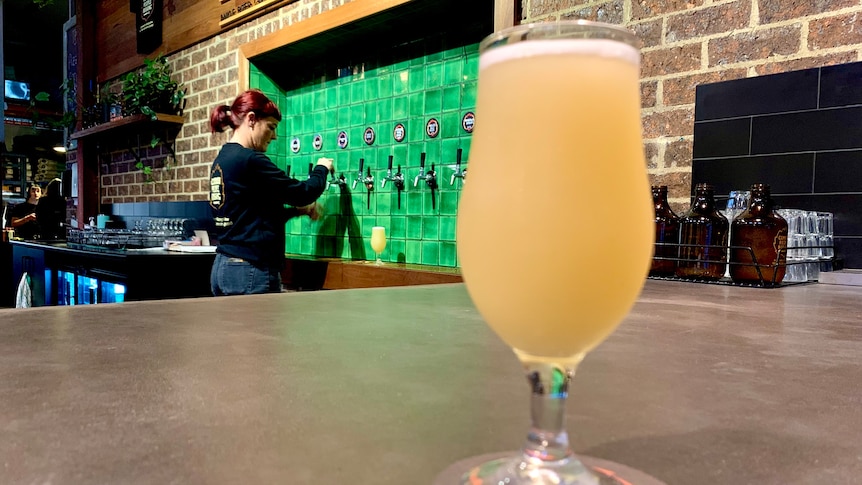The last remaining commercial guava farmer in the Northern Rivers of New South Wales is preparing to rip out two-thirds of the orchard’s 3,000 trees.
Key points:
- The Schmidts sell guavas from 1,000 trees to Brisbane, Sydney and Melbourne markets for a premium price
- Wet weather made it difficult for the Newrybar couple to get in the orchard to harvest
- A Bangalow craft beer brewery has used excess guava fruit to produce a seasonal sour beer
It follows one of Australia’s largest growers bulldozing his orchard on the Alstonville plateau earlier this year to convert to macadamias.
Now Phillip and Janice Schmidt at nearby Newrybar are also considering the popular native nut as a replacement tree crop.
“Avocados? Macadamias? We’re yet to make our mind up, but obviously, the land should be kept productive for the sake of the country and everyone,” Mr Schmidt said.
The Schmidts sell guavas from 1,000 trees to Brisbane, Sydney and Melbourne markets for a premium price.
But the fruit from the remaining 2,000 trees, previously sold for juicing, is being left to rot on the ground or gobbled up by cattle on agistment.
The former CSIRO geologist, who “accidentally” fell into guava farming when he bought the coastal property on retirement, said they were not dependent on the juicing income, but for others in the industry, it had been devastating.
“It’s been a declining part of our industry for over 10 years, and it’s finally reached the stage where I don’t think any guavas from northern NSW are used for juicing,” he said.
“We don’t really know what the cause of it is, but I suspect that imports from overseas could be a factor.”
But Queensland-based processor Tropico Fruits has confirmed it does not import any guava product for its juices.
The company has in previous years bought guavas from the Northern Rivers but said it never had juicing contracts with growers.
Tropico Fruits chief executive Dave Alderton said it had individual standalone seasonal arrangements based on each year’s supply and demand.
He said that despite offering such an arrangement this year for guavas, neither grower in the Northern Rivers was able to supply the fruit.
Constant rain hurts guava harvest
In addition to the unsold juice fruit, the weeks of rain during this year’s harvest resulted in an excess of table fruit on the farm.
Mr Schmidt said that initially, it was looking like a bumper guava season.
“But then we kept on having rain, more rain, more rain until we reached the point where we were unable to actually pick the fruit because we had no means of accessing or at least getting a vehicle down to take the fruit out,” he said.
“We lost two weeks when we just simply couldn’t get down here, and those two weeks are probably our most productive actually.”
The result was a lot of fruit too ripe for the market that ended up being shared with friends or given to the cattle.
“The cattle love it,” he said.
“They actually follow us down to the packing shed, and they turn up at the packing shed and wait outside.”
The upside to the constant rain was much larger guavas, with the skin able to keep up with the growth of the fruit without splitting.
Guavas saved for sour beer
While the 40-year-old guava industry in the Northern Rivers has declined dramatically, the craft brewery sector in the region is booming.
The newest brewery, Common People Brewing Co at nearby Bangalow, is working with local producers on special batch brews.
General manager Jay Kempnich said they sourced some of the Schmidts’ excess fruit to make a limited edition seasonal beer for the weekend’s self-drive Harvest Food Trail.
“We infused guava and some of our fresh lilly pillies from our own trees from out the front of the brewery here into a sour beer and made a delicious, refreshing guava beer,” he said.
The brewery, which opened in January, brews 600 liters at a time with eight beers, three of those its flagship beers.
“Then we’ve got the other five taps that are dedicated to doing seasonal and special batch brews, using local ingredients from the area and collaborations with local businesses where we can,” he said.
Another of those collaborations is with Barefoot Farm Byron, a pecan grower and processor in the nearby Eltham Valley.
“We put 10 kilos of their pecan nuts into one of our 600-liter batches and have done a full batch of a pecan-infused brown ale,” he said.
.
